Sometimes in life things come very easily and sometimes you mess up. Last night I played one of the worst moves I've ever made in a long chess game--long meaning 90 minute + 30 second increment. In short, I had no excuse for making this mistake. So, with no further ado, let's see what can be learned from such a blunder.
White: Frank Johnson (2352)
Black: Reed Russell (2037)
1. e4 c5 2. Nf3 Nc6 3. d4 cxd4 4. Nxd4 g6 5. Nc3 Bg7 6.Be3 Nf6 7. Bc4 Qa5 8. O-O Ng4?!
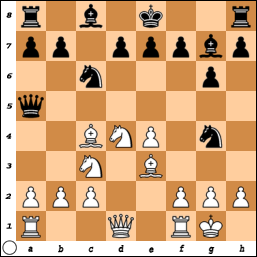 |
| Position after 8...Ng4?! |
This is a bit of a mistake and I rightfully punish it.
9. Qxg4 Nxd4 10. Nd5!
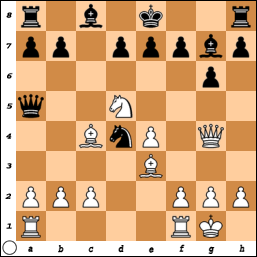 |
| Position after 10. Nd5! |
10...e6 11. Qd1 Qc5
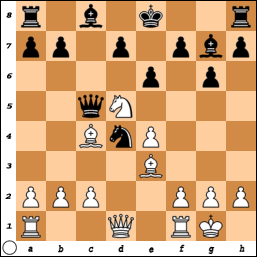 |
| Position after 11...Qc5 |
So we reach the position of my undoing. I've actually played flawlessly to this point. Any number of moves are good here, but the simplest is 12. Bb3! exd5 13. c3 when the computer gives me almost 2 pawns advantage. I saw that line and thought it looked good, but I also thought I saw something better. I actually made two mistakes here in one move, because what I thought I saw could have been easily achieved by playing 12. Bxd4 Bxd4 13. Nc7+ which would have been simple enough; however, that still isn't as good as Bb3. So what did I play?
12. Nc7+??
A second after I played it I realized my mistake.
12...Qxc7 13. Bxd4 e5
And I lose a piece.
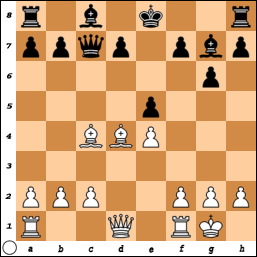 |
| Position after 13...e5 |
At this point I had a choice. I honestly thought about resigning and heading home. It was the last round and I couldn't believe my mistake. Instead, I settled in and hoped for a miracle.
Step 1: Calm down
14. Bxf7+ Kxf7 15. Bc3 Qc5 16. Kh1 Re8 17. Qd2
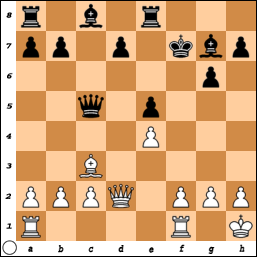 |
| Position after 17. Qd2 |
I have a pawn and his king in the center of the board for my piece. Not nearly enough, but it's something. It would have been easy to play moves like f4 right away, but Qd2 is a more solid move because it creates multiple ideas. The more my opponent has to think about, the more chance I have at him falling apart.
Step 2: Create threats
17...a5 18. f4 Kg8 19. f5
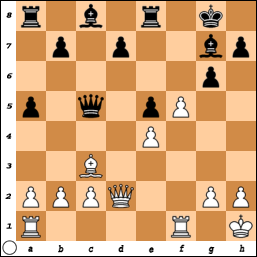 |
| Position after 19.f5 |
The idea is f6-f7. The biggest thing was to create problems, any problems. My opponent was thinking hard. I had around 50 minutes remaining, he had around 20.
Step 3: Think on his time
The following moves were played almost immediately by me, because I guessed what he was going to play and thought about my move on his time...
19...Ra6 20. Rad1 gxf5 21. exf5 Bh6 22. Qe2 Rf6 23.Rd3 Qe7 24. g4 b6 25. h4 Bb7+ 26. Kh2
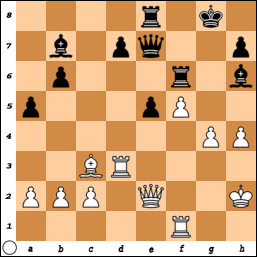 |
| Position after 26. Kh2 |
At this point black is still much better. In fact, there's a line that basically wins. 26...Bf4! because if 27. Rxf4 Qxe7 28. Rxe7 Bxf6 29. Re1!! white has no adequate way to stop mate. This would have won, but here's the thing: He had to calculate several moves in a line that looks on the surface to be suspect. In short, he's going to have to earn his victory. If he sees that line but doesn't find 29.Re1 then the whole idea doesn't work, which brings me to...
Step 4: Calculate the critical position.
26...Rd6
Spend a good deal of time in the critical position and come up with a clean choice. Then don't turn back. I thought for over ten minutes here and came up with a line. Then I played follow-up moves practically instantaneously. All of this put my opponent in more time pressure.
27. g5 Rxd3 28. cxd3 Qd6?
 |
| Position after 28...Qd6? |
Finally he breaks! 28...Bf8 was holding but difficult to play because 29. f6 Qf7 30. h5 looks intimidating. In fact, white may have enough to draw now regardless.
Step 5: Don't let up the pressure!
Just because I am equal now doesn't give me an excuse to let up!
Step 6: Psychological Warfare
My opponent had stopped notating. He was under five minutes but with increment you must keep notating the whole game; no exceptions. I could have pointed this out to him immediately, but instead I decided to think about my move and decide what I would play. Then I got up and notified the TD to tell my opponent to keep notating and immediately I moved. Thus I put the maximum pressure on him. I didn't do it meanly; I even gave him my scoresheet to help him update, but I'm sure it rattled him and it cost him 30 seconds.
29. gxh6 Qxh6 30. Qg4+ Kf7 31. f6 Bc6
Step 7: Calculate to the end
32. Be1!
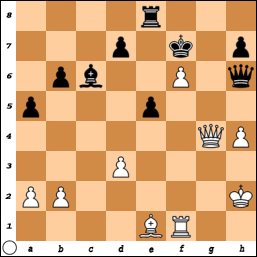 |
| Position after 32.Be1 |
I give this move an exclamation point for a simple reason: other moves were much easier to calculate. Was this theoretically the best move on the board? No. In fact, after this move black is slightly better if he plays 32...Qg6. And yet, I didn't care. This move embodies all the principles I wrote about up to now: it is patient and calculated. I counted on him playing Rg8 and I would have immediately followed up with Qc4+ Kf8 Bb4+ ab4 Qxb4+ Kf7 Qe7+ Kg6 Rg1+ Kf5 Rf1+ with a draw. If he saw this, he earned it. But it was not so easy to find.
I got up and went to restroom after Be1 and returned a minute or so later to find 32...Rg8 on the board, but more importantly I noticed immediately that my opponent's flag was down. He had taken too much time calculating it and somehow I had come back and won this game.












